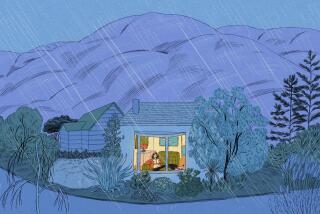Home Alone--Again : ‘Kids on Their Own’ Class Gives Latchkey Children Skills to Care for Themselves Until Parent Returns
- Share via
You know what they say about latchkey kids. They have the world’s cleanest parents.
“When the phone rings, (the parents) are in the shower. When there’s a knock at the door, they’re in the shower,” said Fern Margolin, instructor for a class called “Kids on Their Own,” given earlier this month by the Irvine Family Services Program.
One of Margolin’s students gave her another example. After a maintenance man let himself into her apartment with a passkey--she hadn’t answered his knock--”I went in the bathroom and turned on the shower,” the girl said. “And while he was there, I kept saying, ‘Mom, are you done yet?’ ”
“That’s why you should always answer the door,” Margolin said. “If you don’t, they’ll think no one is home.”
Answer it, but don’t open it, “not even for a policeman or a repairman,” Margolin said. “And if the person starts giving you trouble, ask for their name and phone number.”
The Irvine class was addressing a growing need, not only for children who must care for themselves after school and during the summer--about 140,000 children 10 to 15 years old in the county, according to a 1987 report--but also for those whose parents leave them home alone for anywhere from a few minutes or several hours while they run errands.
In the county, 70% of the mothers of children 6 to 14 years old are in the labor force, according to a 1984 report by the Orange County Commission on the Status of Women. And the 1987 study by the Planning Programs for Young Adolescents Project found that about 3% of children 10 and older are in formal day care.
Although Planning Programs for Young Adolescents, under the auspices of the Coalition Concerned with Adolescent Pregnancy, was originally set up to quantify and find answers to the county’s latchkey problem, it probably won’t get as far as the second step. Because of a budget cut, the program will end June 30 unless other money is found, according to Irene Dardashti, its administrator.
Project Home Safe, a pilot project that involves home economists in developing both immediate and long-term solutions to the problem, operates in Orange and Los Angeles counties and four other California metropolitan areas.
Irvine’s “Kids on Their Own” class, which is not associated with Project Home Safe or Planning Programs for Young Adolescents, focused on the children’s immediate needs.
“We’re not recommending that children be left home alone,” Margolin said. “But the fact is, they are, so we want them to have the skills they need to take care of themselves.”
Margolin went through a checklist of safety and first-aid procedures, from answering the phone to dealing with fires to preparing food.
Some children have become so dependent on high-tech crutches that they needed to learn old-fashioned ways, just in case. “What do you say when you answer the phone?” he asked.
“You let the answering machine get it,” someone shouted.
“But what if you happen to pick it up?” Margolin asked.
“Just say your parents cannot come to the phone right now and take a message,” a child said. “If someone starts bothering you on the phone, ask for their name and phone number, and after you hang up, call someone.”
Margolin also advised the children to turn on an outside light if they are home alone after dark and to keep the stereo or TV low enough that they can hear unfamiliar sounds. She taught them to make a list of important phone numbers to keep handy and cautioned them to call 911 only in a true emergency.
She warned them not to use the stove when their parents are not home, although Margolin said the microwave is all right--”but you have to be careful not to get burned. Even if you make microwave popcorn, watch out for the steam.”
Margolin’s rules for kids left at home alone also include:
* “Let only well-known neighbors know you are home alone, so they can watch for anything unusual around the house. If you hear anything that frightens you, call a trusted neighbor or your parents.
* “In case of fire, get out of the house and call the fire department from a neighbor’s house. If you have a sister and she’s in another room and you can’t get to her, don’t try to go back. Tell someone about it right away.
* “If your bedroom is upstairs, get your parents to make a sheet rope or buy you a flexible ladder so you don’t have to jump to escape a fire.
* “Never attempt to put out any fire yourself except a small kitchen fire.
* “If you or a sister or brother swallows something poisonous, don’t try to induce vomiting. You might make the damage worse. Instead, call the Poison Control Center.
* “Do homework or something else useful. A busy person does not get in trouble.
* “It is all right to be afraid, but don’t panic. Talk to your parents about any fears or questions you may have.”
More to Read
Sign up for Essential California
The most important California stories and recommendations in your inbox every morning.
You may occasionally receive promotional content from the Los Angeles Times.










